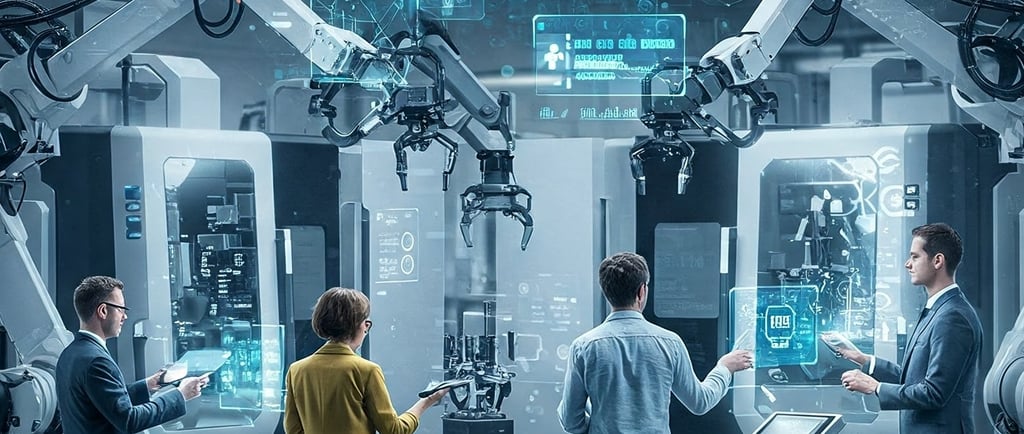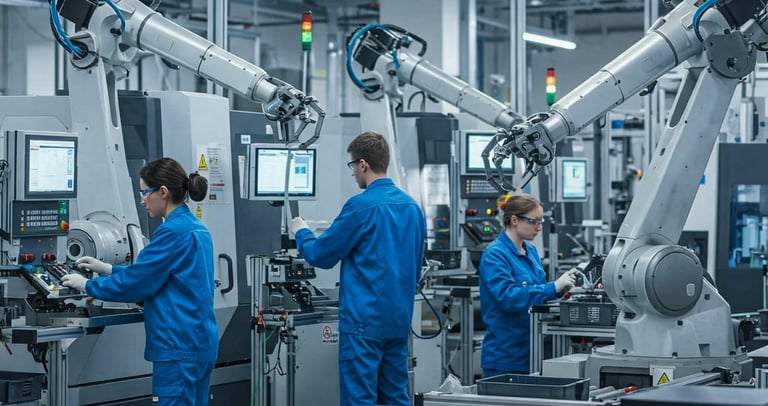Demystifying Industry 5.0: a human, sustainable and resilient approach (beyond AI)
In this article we demystify Industry 5.0, exploring how human-machine collaboration, sustainability and resilience are shaping the next industrial era.
Marc Garnacho
5/7/20252 min read


What if industrial technology not only optimised, but also protected our future? If you've been wondering something similar, then you are beginning to understand the essence of Industry 5.0. Far from being a simple continuation of the advanced automation we met in Industry 4.0, this new paradigm represents a fundamental evolution where human-machine collaboration, an inescapable commitment to sustainability and robust adaptability define the industrial future.
To appreciate the magnitude of this change, it is worth recalling the transformative impact of Industry 4.0. Deep digitisation, interconnected systems and the power of data analytics opened up new frontiers in production, driving efficiency and innovation. However, Industry 5.0 emerges as a natural evolution, a response to the need for a more holistic approach where technology not only optimises processes, but also enhances the human role and protects our planet.
Imagine a future where technology is put at the service of people. This is the heart of Industry 5.0: a human-centred approach. Here, technology does not seek to replace, but to empower. Think of collaborative robots, so-called cobots, working in harmony with operators, freeing them from repetitive tasks and allowing them to concentrate on what they do best: innovating, solving complex problems and making strategic decisions. Intuitive tools and augmented reality become allies, facilitating learning, the execution of complex tasks and improving ergonomics in the work environment.
But Industry 5.0 also looks to the future of our planet. Sustainability is an unavoidable pillar. Environmental and social responsibility are no longer an option, but an essential requirement. In this context, 5.0 technologies become key tools to build a greener future. The advanced Industrial Internet of Things (IIoT) enables precise resource management, optimising energy consumption and minimising waste. Digital twins facilitate the design of products with a longer life cycle and greater recyclability, while transparency in material traceability fosters more ethical and responsible supply chains.
In a world where uncertainty seems to be the new normal, resilience becomes the key to survival. Industry 5.0 builds solid foundations for companies to adapt and thrive in the face of disruption. Digital twins, powered by artificial intelligence, make it possible to simulate complex scenarios and anticipate potential problems not only in supply chains, but also in the analysis of production and maintenance planning. This combination becomes a strategic ally to predict risks and optimise production in real time, ensuring business continuity and an agile response to changing and unpredictable market demands.


It is crucial to demystify a common idea: Industry 5.0 is not synonymous with Artificial Intelligence. While AI plays a crucial role, it is only one piece of a much broader mosaic. Advanced and collaborative robotics, IIoT, digital twins, augmented reality and 3D printing are equally essential. What really defines Industry 5.0 is the synergy between these technologies, guided by the principles of a human approach, sustainability and resilience.
The adoption of this new industrial vision is already leaving a tangible footprint: more efficient processes, significantly improved quality of work, reduced environmental impact and strengthened adaptability.
Is your organisation ready to embrace the next wave of industrial transformation? At Enginhum, we are committed to guiding companies on this journey, helping them understand and unlock the true potential of Industry 5.0 to build a future that is more people-centric, more planet-friendly and more prepared for the challenges to come.
Places
Castellar del Vallès, Barcelona, Cataluña
La Guardia, Pontevedra, Galicia
Connect with Enginhum
Contact with Enginhum
Marc Garnacho - +34 606.683.378
Martí Segura - +34 661.727.166
Information
Opening time
Monday to Thursday: 8:00 - 18:30
Friday: 8:00 - 15:00
